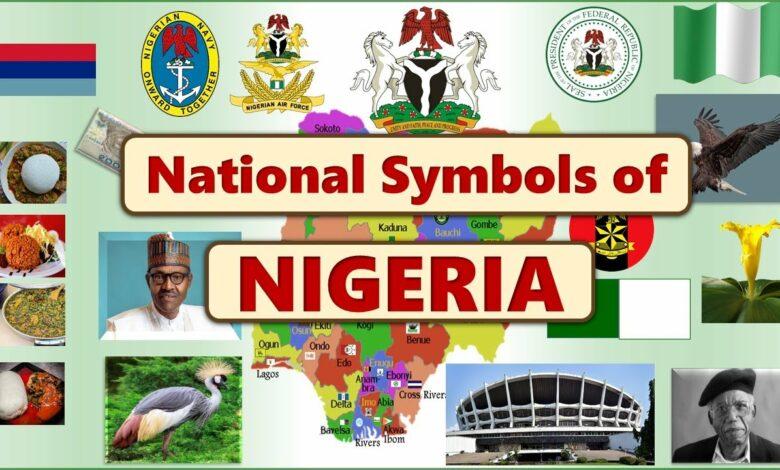
5 Importance of National Symbols in Nigeria
Five Importance Of National Symbols In Nigeria – National symbols are significant elements that represent a country’s identity, values, and history. They serve as a reminder of a country’s heritage and are often imbued with cultural, political, and emotional significance. Nigeria, like other countries, has a range of national symbols that reflect its unique history and culture. In this blog, we will discuss 5 important of national symbols in Nigeria.
National symbols in Nigeria include the national flag, coat of arms, national anthem, currency, and the national pledge. These symbols are significant in shaping the identity of the country and its people. The national flag represents the country’s sovereignty and unity, while the coat of arms symbolizes the country’s strength and diversity. The national anthem reflects the country’s history, values, and aspirations, while the currency showcases the country’s economic development. Finally, the national pledge reflects the country’s commitment to unity, peace, and progress. Understanding the importance of these symbols is crucial in fostering patriotism and national unity. In the following sections, we will discuss in more detail the importance of these national symbols in Nigeria.National Symbols in Nigeria
👉 Relocate to Canada Today!
Live, Study and Work in Canada. No Payment is Required! Hurry Now click here to Apply >> Immigrate to CanadaRead Also: 10 Importance of Boy-Child Education in Nigeria
The Significance of National Symbols in Nigeria
National symbols are important elements that represent the identity of a country and its people. In Nigeria, national symbols are imbued with cultural, political, and emotional significance, and are considered an essential part of the country’s heritage. These symbols play a vital role in shaping the identity of the country and its people, as well as fostering patriotism and national unity.JAMB Portal
National symbols in Nigeria include the national flag, coat of arms, national anthem, currency, and national pledge. These symbols represent various aspects of the country’s history, culture, and values. For example, the national flag represents the country’s sovereignty and unity, while the coat of arms symbolizes its strength and diversity. The national anthem reflects the country’s history, values, and aspirations, while the currency showcases its economic development. The national pledge reflects the country’s commitment to unity, peace, and progress.
One of the primary reasons for the significance of national symbols in Nigeria is the country’s diverse population. Nigeria is home to over 250 ethnic groups, each with its unique culture and history. The use of national symbols helps to unify the country’s diverse population by creating a shared identity that transcends ethnicity and regionalism.Information Guide Nigeria
Another reason for the significance of national symbols in Nigeria is their use in promoting national values and aspirations. The national anthem, for example, celebrates the country’s history, values, and aspirations, reminding citizens of the need to work towards a better future for themselves and their country. The national pledge similarly emphasizes the importance of unity, peace, and progress, encouraging citizens to work towards these goals.
Read Also: 10 Importance Of Agricultural Marketing In Nigeria
Historical Overview Of National Symbols In Nigeria
National symbols play an important role in representing the identity of a country and its people. Nigeria has a rich history and a diverse culture that is reflected in its national symbols. In this blog, we will provide a historical overview of national symbols in Nigeria, highlighting the significance of each symbol and their evolution over time.
One of the most important national symbols in Nigeria is the national flag. The current Nigerian flag, which was adopted in 1960, consists of three vertical stripes of green, white, and green. The green stripes represent Nigeria’s agricultural wealth, while the white stripe represents peace. Before the adoption of the current flag, Nigeria had used several other flags, including the Royal Niger Company flag, the Union Jack, and the Nigerian Civil Ensign.
👉 Relocate to Canada Today!
Live, Study and Work in Canada. No Payment is Required! Hurry Now click here to Apply >> Immigrate to CanadaAnother important national symbol is the coat of arms, which was adopted in 1960. The coat of arms features a black shield with a wavy white pall, symbolizing the meeting of the Niger and Benue Rivers at Lokoja. The black shield also represents Nigeria’s fertile soil, while the two supporting horses or chargers on each side represent dignity. The eagle represents strength, while the green and white bands on the top of the shield represent the rich soil.
The national anthem is another important national symbol in Nigeria. The current national anthem, “Arise, O Compatriots,” was adopted in 1978 and replaced the previous anthem, “Nigeria, We Hail Thee.” The lyrics of the national anthem reflect Nigeria’s history, values, and aspirations, and the melody is based on the traditional Nigerian song, “Oyo yo.”Romantic Love Messages
The currency of Nigeria also serves as a national symbol. The current currency, the Naira, was introduced in 1973 to replace the pound sterling. The notes feature images of prominent Nigerian leaders, including Nnamdi Azikiwe and Obafemi Awolowo, as well as various Nigerian landmarks.
In addition to these national symbols, the national pledge is an important aspect of Nigerian culture. The national pledge, which was introduced in 1976, is recited by citizens to express their commitment to the unity, peace, and progress of Nigeria.
Read Also: 10 Factors Affecting the Productivity of Pasture in Nigeria
Five Importance Of National Symbols In Nigeria
1. Fostering National Unity:
National symbols play a significant role in promoting national unity and integration among the diverse ethnic groups in Nigeria. They serve as a unifying factor and remind Nigerians of their shared heritage and identity, regardless of their differences in language, culture, or religion. The national flag, for example, represents the unity and indivisibility of the country, while the national anthem reflects the values and aspirations of the Nigerian people.
2. Preserving Cultural Heritage:
National symbols are also essential in preserving and promoting Nigeria’s cultural heritage. They serve as a window to the country’s past and a bridge to its future. The national coat of arms, for example, depicts Nigeria’s rich history and diverse cultural heritage, with the black shield symbolizing Nigeria’s fertile soil, the two supporting horses representing dignity, and the eagle standing for strength.
Read Also: 10 Importance of Agriculture in Nigeria
3. Promoting National Identity:
National symbols help to create a sense of national identity and pride among Nigerians. They represent the country’s values, beliefs, and aspirations, and instill a sense of patriotism and loyalty to the nation. The national currency, the Naira, is an example of a national symbol that represents the economic strength and stability of Nigeria.Good Morning Love Message
4. Encouraging Tourism:
National symbols also play a significant role in promoting tourism in Nigeria. They attract both local and international visitors who are interested in experiencing the country’s history, culture, and natural beauty. The National Theatre, for instance, is a national symbol of Nigeria’s rich cultural heritage and is a popular tourist destination.
5. Promoting International Relations:
National symbols also play a role in promoting Nigeria’s image and reputation abroad. They help to establish a positive and recognizable identity for the country and promote Nigeria’s cultural, economic, and political interests on the global stage. The National Sports Teams, for example, represent Nigeria in international competitions and showcase the country’s sporting prowess to the world.NYSC Portal
Read Also: 10 Importance of Community Journalism in Nigeria
Conclusion
In conclusion, national symbols are essential elements that promote national unity, preserve cultural heritage, promote national identity, encourage tourism, and promote international relations. Nigeria’s national symbols reflect the country’s history, values, and aspirations and serve as a source of pride and inspiration for the Nigerian people.
Check JAMB RESULT
Check and Confirm: How much is Dollar to Naira








